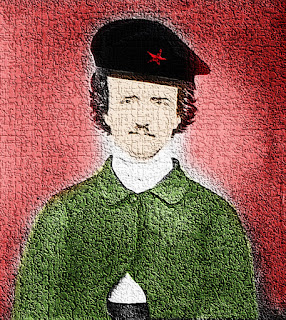Class consciousness in Poe
A minor element that pops up in several poems of Edgar Allan Poe is the class divide—manifested principally in wealth disparity—between him and others who have influence over his destiny. For example, a cousin, Neilson Poe, once attempted to dissuade Edgar Allan Poe’s future wife Virginia (also a cousin) from marrying him. Neilson was a lawyer and newspaper owner, who would go on to serve as a probate judge and director of a canal and a railroad, so he clearly ran on a more prosperous track. Poe was adopted by a well-to-do couple (the Allans) but left out of their will. Later, he would have romantic dalliances with society ladies, such as Frances Sargent Osgood, but Poe always struggled financially. Some of these associations were approached in Poe’s poetry.
For example, in “To M——” (1828), Poe concedes “that my earthly lot/Hath little of earth in it,” and laments the disadvantage it puts him at in pursuing a romantic interest, bittersweetly musing how a society lady could “sorrow for my fate/Who am a passer by.” After Neilson Poe tried to intervene against his marrying Virginia, Edgar had to lobby Virginia’s mother to let him marry her, offering proof of financial ability by showing he had taken a newspaper job, which may have been humiliating to the young poet and writer to have to do.
This class consciousness figures largely in several of Poe’s poems about the death of his beloved. In “Annabel Lee” (1849), which is often associated with Virginia, Poe describes an internal family conflict with disapproving and more powerful relatives. Poe defiantly brags that “our love it was stronger by far than the love/Of those who were older than we—/Of many far wiser than we,” hinting at possible criticism and condemnation from “older” and “wiser” commentators. And when the heroine succumbs and passes away, “her high-born kinsman came/And bore her away from me,/To shut her up in a sepulchre.” Poe does not even control where her body ends up; just as when Virginia died, she was buried in a plot belonging to their landlords.
The resentment boils to the surface in “A Pæan” (1831), and its final version, “Lenore” (1843). In the earlier work, Poe sprinkles observations about the society observers that seem to bristle with disdain for them: “Her friends are gazing on her,/And on her gaudy bier,” he remarks. The line recalls a similar line in another poem, “The Sleeper” (1831), in which Poe wryly observes that death triumphs over gaudy burial arrangements because death is “Triumphant, o’er the crested palls,/Of her grand family funerals.” In “A Pæan,” the relatives are portrayed as obsessed with the material aspects of the funeral: “they speak of her ‘costly broider’d pall’,” but they are hypocrites because they only “loved her for her wealth,” while they “hated her for her pride,” and now only “love her—that she died.”
In Lenore, Poe unloads a stern reprobation of their hypocrisy:
How shall the
ritual, then, be read? — the requiem how be sung
By you — by yours,
the evil eye, — by yours, the slanderous tongue
That did to death
the innocence that died, and died so young?
He basically says their gossip is
what killed her! They, in turn, chide
him to “rave not thus,” and comment that the untimely death of his young bride
has made him “wild.” In “A Pæan,” he is “drunk” with love and the relatives
mildly scold him to tone down his voice so “That the dead may feel no wrong.”
He is made to feel uncouth and out of place—in itself a class commentary—for
his protests.
Of course, Poe has the last word
because he gets to portray the “high-born kinsmen” as the ones who really were
out of line, and he reproves them also by noting that death will triumph over
their wealth, and that the dead, like Lenore, will escape, “To friends above,
from fiends below,” and “From grief and groan, to a golden throne, beside the
King of Heaven,” and that, after all the hatred and division, he (Poe) will
persevere undeterred in the righteousness of a true love as enduring as “the
sounding sea.”





Comments
Post a Comment